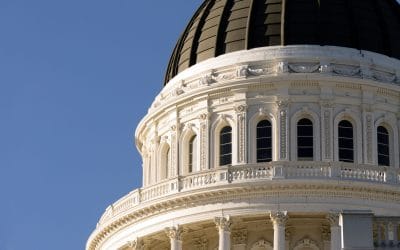Capitol Advisors Group has produced a series of comprehensive client briefs detailing new education laws that were passed by the Legislature and signed into law by Governor Brown in 2017. Each brief is organized by subject area and includes an executive summary highlighting major changes we think you should know about. Bills signed by the Governor take effect on January 1, 2018, unless the bill specifically states otherwise. A PDF version of this report is available here.
California policymakers continue to focus legislative efforts on expanding broadband connectivity in some of the more remote parts of the state, and are wrestling with the growing issue of data security from a variety of potential domestic and international threats.
Major wireless expansion bill vetoed by Governor Brown. AT&T annually spends more on lobbying state government than any other entity, and is politically very powerful. In 2017, the company made SB 649 by California Senator Ben Hueso (D-San Diego) their top legislative priority. The bill would have limited the ability of local governments to deny or regulate the placement of cellular equipment in or on public rights-of-way, including street lights and utility towers. The author and sponsoring telecommunications companies claimed the bill was necessary to improve connectivity across the state, and to prepare for the next wave of cellular service (faster “5G” broadband). The bill faced strong opposition from local governments (mostly cities and counties), which argued the bill would have reduced local input on possibly aesthetically unappealing equipment, and that there was no pressing need for the bill. In his veto message of SB 649, Governor Brown said, “there is something of real value in having a process that results in extending this innovative technology rapidly and efficiently. Nevertheless, I believe that the interest which localities have in managing rights of way requires a more balanced solution than the one achieved in this bill.” Watch for this issue to return in 2018 in a bill that concedes more control to local governments.
The Governor signed the following technology bills this year:
Data
- AB 1022 (Irwin) – Information technology: Technology Recovery Plans: inventory
This bill requires state agencies to include within their Technology Recovery Plan (TRP) an inventory of all critical infrastructure controls and associated assets, and to provide that inventory to the California Department of Technology (CDT). Additionally, the bill allows any other state or local governmental agency to voluntarily submit a similar inventory to CDT.
Chapter 790, Statutes of 2017 - HR 10 (Chau) – Relative to California Data Privacy Day
This resolution declares January 28, 2017, as California Data Privacy Day, to increase awareness of privacy and data protection issues among consumers, organizations, and government officials.
Adopted
Technology
- AB 1034 (Chau) – Government interruption of communications
Current law establishes the California Law Revision Commission (CLRC), which studies topics approved by concurrent resolution of the Legislature. Additionally, current law authorizes, under certain emergency or dangerous circumstances, supervising law enforcement officials, government entities, or providers of communications, to interrupt communications services. This bill takes these existing provisions, currently residing in the Public Utilities Code, and moves them, at the recommendation of CLRC, to the Penal Code. The bill also makes a few substantive changes, including providing for a post-interruption judicial review in cases in which the government entity terminates service without warning.
Chapter 322, Statutes of 2017 - AB 1665 (Garcia, Eduardo) – Telecommunications: California Advanced Services Fund
This bill authorizes the California Public Utilities Commission (CPUC) to collect an additional $330 million, via a $66 million annual surcharge on all intrastate telephone users, beginning January 1, 2018 through 2022, for deposit into an existing program to address the digital divide, known as the California Advanced Services Fund (CASF) program. This bill makes numerous changes to the program, including: replacing the existing program goal from a statewide goal to a regional goal in order to target funding for broadband access to largely rural areas; establishes an adoption account; and makes numerous changes to limit and target funding for broadband infrastructure deployment. The bill also creates the Broadband Adoption Account, and specifies that moneys in the account shall be available to increase publicly available or after-school broadband access.
Chapter 851, Statutes of 2017 - AJR 7 (Mullin) – Internet: net neutrality: access
This resolution urges the President of the United States and Members of the United States Congress to continue to protect net neutrality, open Internet access, the federal Lifeline program, and the E-rate program.
Chapter 151, Statutes of 2017 - SCR 30 (Pan) – Education technology
This resolution declares that the Legislature recognizes the need for improving the ongoing implementation and use of technology in educational institutions and identifying best practices for technology equipment upgrades.
Chapter 97, Statutes of 2017




0 Comments